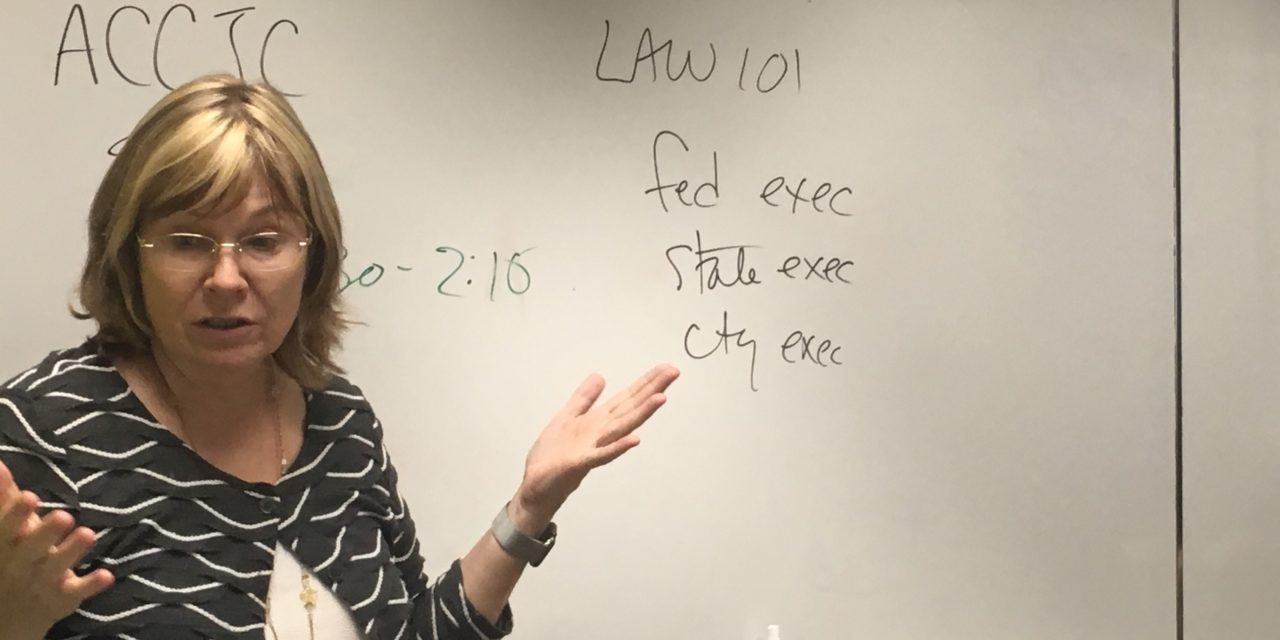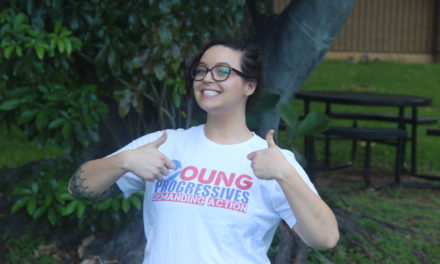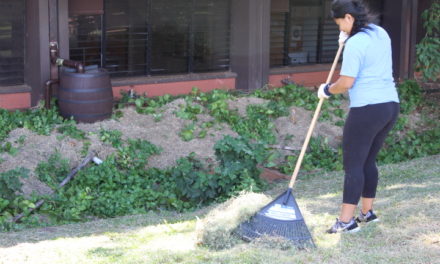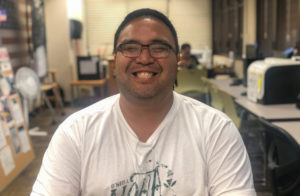By Katlin Cilliers | Staff Writer
Ask a Professor is a regular feature in which the Kapiʻo News will highlight the real-life careers and jobs that stem from areas of study at Kapiʻolani Community College.
Professor Susan Jaworowski is the paralegal program coordinator at Kapiʻolani Community College. She moved to the Aloha State in 1984, a year after she’d graduated from law school in the University of California at Davis. She’s worked in all three branches of the government, and nowadays she thrives in sharing her knowledge and expertise at KCC, where she’s worked since January 2007.
To her, having some knowledge of the law is essential to citizens, regardless of pursuing a career in it or not.
“[The country] requires our citizens to participate in government without really telling them how to do that,” she said. “You know, when I ask my first-semester students, ‘How do you interact with government?’, they say, ‘We vote and we pay taxes.’ But there’s so much more than that. There’s so many better ways to communicate. … But if people don’t know about that, they can’t exercise their rights.”
Jaworowski sat down with Kapiʻo News to discuss the ins and outs of the paralegal profession.
What work experiences have you had in Hawaiʻi?
I worked at the court. The court system hires research graduates for one year to help them with their writing and their drafting and their research. … I came here and I also got a clerkship at the Intermediate Court of Appeals. and I spent one year there. Unfortunately, it was [only] a one-year job, because I loved it.
Then I went into a private practice in a law firm where I did civil litigation, not criminal, but that’s another type of law you can do, it’s civil law. Then, after a few years I moved to the legislature.
What did each of these jobs entail?
As a law clerk, you meet regularly with the judges. They assign you different tasks. This involves reading the records that came from the trial, it involves doing legal research on the issue, it involves writing drafts of memos to the judges. Memos are internal documents that are only between you and the judge. Some judges also let you write draft opinions, and then they look at it, and they can edit it. And if they like it, they will send it out with their name on it. So, I did that for a year.
We also heard oral arguments at the court, and we had to take turns timing [these arguments] and informing the people who were speaking of the time limits, so we got to see the court in action, you know? Doing their oral arguments and asking questions about, and of course the questions are designed to weigh their way around the issue. [It was] very interactive, very interesting.
The law firm I worked at was in civil litigation, and I did lots of legal research there. I went to court and handled motions. I did small claims court. … Then I decided that litigation is very busy and it often has late nights and weekend work. … So I looked for jobs that would have more regular hours.
The first [government job] that really appealed to me was at the Hawai‘i State Legislature. … My first job there was to draft bills at the request of legislators. They might say, ‘Oh, draft me a bill that will allow people to keep their pets in their apartments.’ Or, ‘Draft a bill that would require the city and county of Honolulu to fix your car if you hit a pothole and your car is damaged.’ That’s what we’d do at the legislation session, which is four months out of the year. The other eight months we’d get specific requests of the legislators to do in-depth reports that were quite lengthy. …
After 16 years, I moved to the Senate majority office. … What I did as Senate majority attorney was to advise the Senate president on real issues I saw coming up on the bills and to sit on the floor with the senate and to answer [legal] questions that might come up there.
What does a paralegal do?
A paralegal is a legal assistant in a law firm, and they can do research, they can do documents, writing documents. They can meet with clients, they can look for experts, they can find evidence.
There’s only three things that a lawyer does that a paralegal cannot do. Those three things are: to represent a client in court, you have to be a lawyer for that; to agree that somebody is, uh, is going to take a case, that’s reserved to lawyers; and to give legal advice. We can’t give legal advice, we can only give legal information. What a paralegal does in each law firm really depends on the nature of the law firm.
Smaller law firms have their paralegal to do it all, from interviewing clients to finding evidence, to drafting motions. Larger law firms and larger businesses tend to have people in specific niches, so for instance, you may be hired at a large law firm to do electronic discovery, you know? Tagging, flagging, and dealing with the documents that are produced by the other side in a lawsuit.
How do you become a paralegal?
Well, in Hawaiʻi, at present you don’t have to have any credential or education to call yourself a paralegal. There are some states that require you to have a certificate or a degree, but Hawaiʻi is not one of them. However, you are at a real disadvantage if you don’t have training. Because, first of all, lawyers don’t often have time to train a paralegal in a thorough and theoretical way. They’re much more likely to say, ‘Do this task’ but then you do it and you don’t really know what the next step may be or how it fits into the whole case.
Also, lawyers don’t really go into things that we cover in our course, such as ethics. The ethics that bind a lawyer also bind a paralegal. The best way is to get a knowledge of both practical skills that you need and the theory of the law, so you can have a big-picture view of what’s happening, plus know all the ethics, plus know all the law office management, plus know all the legal-specific software. And those, the only place you can get in Hawaiʻi is through our program, because there are no other paralegal programs in the UH system or in any school in the state.
What does the job market look like for paralegals?
The job market looks pretty good for paralegals. We are one of those above-average salaries. KCC, when they do their evaluation, they look into the regular salaries and the higher pay salaries, and we fall into the higher-pay category, and the pay actually depends on the law firm, and it depends on whether it’s private or public, for instance, some of our paralegals go to the attorney general office, which is a state department, or they go to the judiciary, which is the salaries, are set by, usually contract. Hold on a second, I’m in front of my computer, I can check those out. I think for most of those jobs they are in the mid-40s. Private law firms can vary.
For legal assistants, [in government jobs] salaries in a range between 44k and 55k. So that’s a salary range. That depends how you can negotiate it, your experiences, you know, that type of thing.
What would you say to someone who is considering a career in law?
It’s just good for people to know all about these resources, even if that field is not for them. Sometimes we get people who are in psychology or they’re in political science and they want to go onto law school, and that’s fine, but you have to get your bachelor’s degree first, right? It also would make sense [to take law courses] while you’re here, and the courses are still inexpensive compared to Mānoa or UH West Oʻahu prices, and say, ‘Do I really like this area? Or was it just kind of thinking I might like this area?’ So they can get a better grip if this is the right field for them.
What kind of skills are needed to thrive as a paralegal?
You should like to write and have decent writing skills. … So, if you don’t like to write, this may be not the field for you. But if you do like to write, but ‘I don’t really know what this legal writing is about,’ don’t worry because that’s part of our training.
You should also be somebody who is good at time management, I think all students in college need to learn time management, and that’s the kind of skills that would work in a law firm. Because law firms often bill their clients by the fraction of an hour.
You also need to have a firm belief in ethics [and] … paying attention to detail. A lot of doing law work [requires practitioners] to be patient, paying attention to detail, make sure you’ve done all of your research, you haven’t just cut it short. I think our students with those capabilities do very well.
What are the best and worst aspects of being a paralegal?
People don’t always realize it, but law is a helping profession. It’s like social workers, it’s like psychologists in that people bring you an issue and you’re trying to help them solve it. … Students love it when they can use their legal knowledge to help their client. They feel empowered, they feel powerful, they feel satisfied, they feel good about themselves. [However,] if you have a paralegal degree that does not entitle you to practice law and give legal advice without working for an attorney. So that said, within that scope, that [help] can [still] feel very empowering, very powerful. They’re helping.
Worst things are working at a law firm where the lawyer doesn’t respect the degree, and instead of using paralegals for all of the things we train them to do, they give them something very dull to do, like make Xerox. … Students may get a little bored and then go looking for a job where they can be appreciated.
[To read previous Ask a Professor features, click here.]






